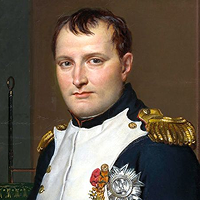Quotes By Napoleon Bonaparte

Leader
Napoleon Bonaparte
Aug 15, 1769 - May 05, 1821
A plan of campaign should anticipate everything which the enemy can do, and contain within itself the means of thwarting him.
Plans of campaign may be infinitely modified according to the circumstances, the genius of the commander, the quality of the troops and the topography of the theater of war.
The strength of an army, like the momentum in mechanics, is estimated by the weight multiplied by the velocity. A rapid march exerts a beneficial moral influence on the army and increases its means of victory.
An army should have but a single line of operations which it should carefully preserve, and should abandon only when compelled by imperious circumstances.
A military maxim, which ought never to be neglected, is to assemble your cantonments at the point which is most remote and best sheltered from the enemy, especially when he makes his appearance unexpectedly. You will then have time to unite the whole army before he can attack you.
Nothing is more rash or more opposed to the principles of war than a flank march in presence of an army in position, especially when that army occupies heights at the foot of which you must defile.
It is contrary to the usages of war to cause your parks or heavy artillery to enter a defile, the opposite extremity of which is not in your possession; since, in the event of a retreat". they will embarrass you and be lost. They ought to be left in position, under a suitable escort, until yoU have made yourself master of thetermination of the defile.
Infantry, cavalry and artillery cannot dispense with each other. They ought to be quartered in such a manner as always to be able to support each other in case of surprise.
Nothing is more important in war than unity in command. When, therefore, you are carrying on hostilities against a single power only, you should have but one army acting on one line and led by one commander.
The effect of discussions, making a show of talent, and calling councils of war will be what the effect of these things has been in every age: they will end in the adoption of the most pusillanimous or (if the expression be preferred) the most prudent measures, which in war are almost uniformly the worst that can be adopted.True wisdom, so far as a general is concerned, consists in energetic determination.
There are certain things in war of which the commander alone comprehends the importance. Nothing but his superior firmness and ability can subdue and surmount all difficulties.
Read over and over again the campaigns of Alexander, Hannibal, Caesar, Gustavus, Turenne, Eugene and Frederic. Make them your models. This is the only way to become a great general and to master the secrets of the art of war. With your own genius enlightened by this study, you will reject all maxims opposed to those of these great commanders.
A general-in-chief should never allow any rest either to the conquerors or to the conquered.
Between a battle lost and a battle won, the distance is immense and there stand empires.
You cannot drag a man's conscience before any tribunal, and no one is answerable for his religious opinions to any power on earth.
Tragedy warms the soul, elevates the heart, can and ought to create heroes. In this sense, perhaps, France owes a part of her great actions to Corneille.
Posterity will talk of Washington as the founder of a great empire, when my name shall be lost in the vortex of revolution.
The most constant, the most powerful, and the most generous of all my enemies [Britain].
I tell you Wellington is a bad general, the English are bad soldiers; we will settle this matter by lunch time.
Popular Authors










